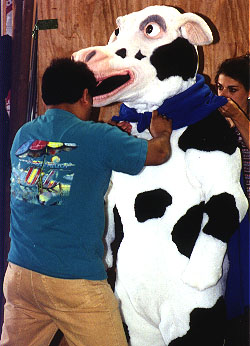
Immediately upon hearing the open border news, Islamofacsists prepare to infiltrate into the US.
Posted on 05/01/2004 10:25:49 AM PDT by Pikamax
By DREW FAGAN From Saturday's Globe and Mail
UPDATED AT 1:42 AM EDT Saturday, May. 1, 2004
Advertisement
Washington — U.S. President George W. Bush committed himself yesterday to getting the border open to Canadian cattle as quickly as possible, raising hopes that the mad-cow crisis will soon be over as he sent Prime Minister Paul Martin home with a small political gift.
At a press conference in the White House Rose Garden, Mr. Martin smiled broadly as Mr. Bush praised Canada's commitments in Afghanistan and Haiti and emphasized for the first time that it is also in U.S. interests to end the border ban.
"My administration is committed to a policy of free trade when it comes to beef," Mr. Bush said. "It's in our nations' interests that live beef be moving back and forth."
The President does not have the authority to order the border reopened, a point that Canadian officials emphasized to dampen expectations that the meeting might result in a breakthrough.
The final decision is now caught up in a complicated regulatory process that may be affected by protectionist sentiment during an election year.
Mr. Bush's likely opponent in the November presidential election, Senator John Kerry, recently provided support with other senators to those fighting to maintain border restrictions. They were rebuked by the Canadian embassy, and the contrast with Mr. Bush's open-border sentiment was noted by the delegation that accompanied Mr. Martin for his two-day visit.
"He essentially sent out the word that he wants a solution as quickly as possible," Mr. Martin said after the White House meeting.
During that meeting the two men spent more than 20 minutes in the Oval Office holding private discussions. They then held a 90-minute meeting and working lunch with numerous Bush cabinet members and officials.
As in the continuing softwood battle, the President "wants a solution that lasts," Mr. Martin said.
Though the mad-cow crisis took centre stage yesterday, the two men discussed numerous issues, including energy development, cross-border pollution and continental security policy. Mr. Martin raised his initiative to create a forum of 20 leaders of the developed and developing world, and made it clear that Canada would not support the militarization of space even if it does sign on to the missile defence shield.
Mr. Martin also expressed his willingness to consider an increased role in the reconstruction of Iraq if authority there is broadened to make it a truly multilateral enterprise.
"I want Canada to do what it feels comfortable doing in Iraq," Mr. Bush said.
"To the extent that the country feels comfortable in helping, we're grateful."
The United States has "no better partner in understanding the power of free societies," he said.
Mr. Martin was reticent about visiting the White House. His January meeting with Mr. Bush in Mexico went well, resulting in two key deals. But the Martin government took weeks to accept Mr. Bush's invitation for a meeting on U.S. soil, conscious of the President's unpopularity in Canada, especially before a possible election.
The bonhomie yesterday, then, took some by surprise. The two leaders praised each other and included their wives in a final photo before wrapping up the press conference. Mr. Martin felt comfortable enough to provide an overview in French of the President's remarks. It was a sharp contrast to the last years of Jean Chrétien's government, when he and Mr. Bush were little more than outwardly polite.
"I've got to say that I really like sharing a press conference with you," Mr. Martin joked. As the two men turned to go back into the White House, Mr. Bush offered that his Texas ranch was nicer still — an apparent offer for the Prime Minister to visit him there, where Mr. Bush entertains close allies.
Away from the cameras, others were equally effusive. Secretary of State Colin Powell refused to compare and contrast the Chrétien and Martin regimes, but offered that relations could hardly be better. They are "solid and complex," he said.
Still, U.S. officials noted that bilateral disputes such as the mad-cow issue are not entirely one-sided. Canada's case might be helped, they said, if Ottawa ended remaining restrictions imposed last December on U.S. shipments. The limits are narrower than those imposed on Canadian cattle, they said, but also are self-defeating in a continental market.
"Both governments are working to have the border opened both ways," said Paul Cellucci, the U.S. ambassador to Canada. "We want the cattle moving."

Disclaimer: Opinions posted on Free Republic are those of the individual posters and do not necessarily represent the opinion of Free Republic or its management. All materials posted herein are protected by copyright law and the exemption for fair use of copyrighted works.